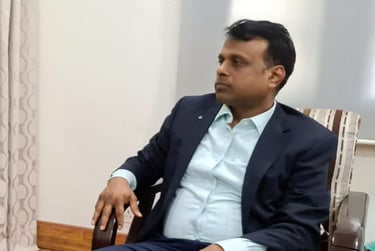"We want to contribute to PM's Jal Jeevan Mission"
‘We worship sources of water Like Ganga ; it is a civilizational responsibility to make efforts to conserve water 'Sunil Kumar Patwari-Founder Chairman Jal Jeevan Dhara Foundation in conversation with Dr Ulfat Jan, freelance Columnist
What is the Jal Jeevan Dhara Foundation about?
We are conceptually inspired by Hon'ble Prime Minister Shri Narendra Modi's Jal Jeevan Mission. The Jal Jeevan Dhara Foundation (JJDF) is actually a non-profit endeavour of the Rashmi Group aiming to raise awareness, contribute in Government’s efforts to save, conserve and provide safe drinking water to every citizen of the country.
Sir, How do you plan to do that?
Headquartered in Delhi, we want to set-up hub units in every State and Union territory to launch a coordinated and result-oriented campaign to raise awareness about the three very basic issues pertaining to drinking water: Conserve Water, Drink Safe Water and easy access to Safe Drinking Water for everyone. The Government of India under the blessed leadership of Prime Minister Narendra Modi Ji has laid out a clear and vibrant roadmap to achieve these objectives through the Jal Jeevan Mission. We have a sincere objective to contribute to this mission by utilizing our resources and network.
Why do you think these three are the basic issues regarding water?
Because we know most of the diseases are water-borne. The sick citizens are a grave public health concern. Every human consumes water, and if we are able to provide safe drinking water to a larger population, we are actually preventing a larger number of citizens from falling sick. It will lessen the load on hospitals and subsequently save the public exchequer from spending on citizens who fall sick because of drinking unsafe water! A healthy citizen is essential for a healthy nation. If we are successful in providing safe drinking water to every citizen, we will be successful in realizing a developed India.
What will be your first step towards achieving your goals?
The first step is raising awareness to conserve water. An important step to conserve water is not to waste water. So we have to ensure judicious use of water. We particularly have to reach out to students in the classrooms and create “water-conscious citizens”. We have a roadmap to reach a vast number of students whom we want to become “water conservation ambassadors.” We also will engage researchers and experts from the universities to conduct research and form a policy in line with the outcome of that research.
What will be the mode of engagement?
We don’t want to stick to only the traditional methods of campaigning-like banners, speeches, seminars etc . No, we have to actually go into the classroom and talk to the student; a focused conversation I mean. You don’t need to use much effort when it comes to talking to young, energetic students. If you talk to them in a sincere, empathetic way, they will listen to you seriously. Yes we will surely use social media and ICT (Information and Communication Technologies) for the purpose.
Why do you think a construction company should work for things like water conservation?
See we Indians have a rich civilization of thousands of years. We worship sources of water like Ganga, Yamuna... Therefore it is not only something about our survival, but a civilizational responsibility to make efforts to conserve water and ensure that every citizen of this great nation has easy access to safe drinking water. This is our inspiration to contribute to the Government’s Jal Jeevan Mission. Jal is our Jeevan and it is our responsibility to secure and promote this Jeevan as a Mission.


,,
An important step to conserve water is not to waste water. So we have to ensure judicious use of water. We particularly have to reach out to students in the classrooms and create “water-conscious citizens”. We have a roadmap to reach a vast number of students whom we want to become “water conservation ambassadors.” We also will engage researchers and experts from the universities to conduct research and form a policy in line with the outcome of that research.
Address
C-171, 2nd Floor Defence Colony, New Delhi - 110024
Subscribe to our newsletter
Contacts
+91 9830302021
info@jaljeevandhara.org